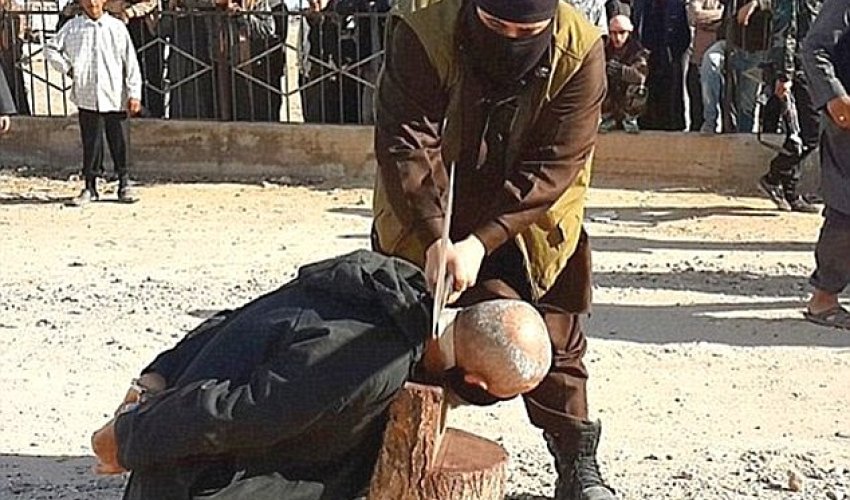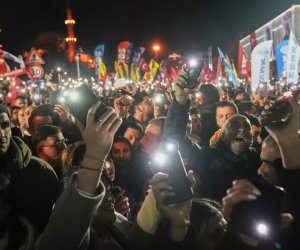Senseless slaughter, corruption and broken promises of money and glory

Dozens of ISIS defectors have told of how would-be jihadis are lining up to leave the terror group, a new report reveals.
The 58 deserters - 51 men and seven women - claimed ISIS followers have grown tired of the bloody executions, special treatment given to foreigners, and the broken promises of money and glory.
Among them are a jihadi bride whose husband was murdered by his fellow fighters, an Indonesian man who spent more time reading the Koran than fighting against 'infidels' and an Indian convert who was made to scrub toilets in Syria.
Almost two-thirds of these defections took place this year and that number is growing, the report's authors claim.
The landmark report by The International Centre for the Study of Radicalisation and Political Violence (ICSR), who analysed interviews with defectors since January 2014, shatters the group's self-proclaimed image of an Islamic 'utopia'.
In a sign of ISIS's global recruitment strategy, defectors came from 17 different countries - with two from Britain.
Many of them were appalled at the senseless executions of innocent people. They claimed ISIS fanatics killed hostages 'at random', tortured villagers who lived under their command and even executed its own fighters.
The former bodyguard of ruthless ISIS commander, Saddam Jamal, revealed how the extremist forced a mother and father to watch as he murdered their children.
Defector Abu Abdullah told the Telegraph how Jamal lined their children up by height and, starting with their 13-year-old son, beheaded each one and hanged their heads outside the school the family were hiding in.
He also saw an emir, or local leader, forcing his eight-year-old son to slit the throat of a captured rebel fighter.
Abdullah said: 'They kidnap and carry out assassinations. They think nothing of bringing down a whole building with women and children inside, just to kill one person.'
Farrukh Sharifov, who was once one of 300 Tajikstan-nationals to be fighting with ISIS, also testified to the brutality and cruelty in ISIS territory.
He told Azadlig Radio how many of his fellow militants were senselessly executed for being 'spies' without a trial or evidence.
Despite deserters' outrage at such barbarism, ICSR notes that most people were shocked by the violence against other Sunni Muslims, and not 'non-believers'.
The defectors who joined for 'selfish reasons' became frustrated when they realised none of the luxury goods, cars and houses they had been promised would ever materialise.
Jamolbee Khamidova's husband sneaked her into Syria after he was promised a life of luxury, wealth and high status. He told her she could 'leave any time she wanted'.
Last month, she told the BBC how they were made to wear gloves and a veil whenever they left their bare homes, laughing was forbidden and they barely washed due to the scarcity of clean water.
She said: 'The children were often sick and there were no doctors or pharmacies. The men could hit you if you went out without a veil.'
Her husband would disappear for weeks at a time and when he returned, she could barely recognise the pale, thin and bloody ISIS fighter standing before her.
One day, he was 'taken away' by two Saudi extremists. Khamidova said she 'did not have the strength to even cry' when two men returned to show her a picture of her husband's corpse.
Those who were attracted by the idea of adventure, brotherhood and glory on the battlefield were left equally disappointed - and some even complained that foreigners were used as 'cannon fodder'.
Ahmad Junaedi, 31, left his four children and job as a meatball vendor in Indonesia to join ISIS in March 2014.
He told the Jakarta Post how an ISIS commander promised to pay off all his debt and said he would receive 'large sums of money' but his salary was just under £30-a-month.
He said: 'We then spent 24 days at a camp filled with only Indonesians and we were introduced to weapons, taught Islamic doctrine and encouraged to have morning jogs.'
Junaedi and 11 other Indonesians rotated spending two-hours a day guarding their post in Al-Bab, Syria, with an AK47 rifle.
They spent the rest of the day reading the Koran, cleaning the house they lived in or trying to contact their families back home.
Others fled after they were disappointed by the 'quality of life' in territory controlled by IS and realised that the image of luxury goods and cars that lured them to join in the first place had failed to materialise.
Another common factor which inspired once-loyal Islamists to defect was corruption. Many supporters of ISIS criticised the privileges given to foreigners over Middle-Eastern fighters.
In November, a defector from India, Areeb Majeed, 23, said 'racist' ISIS leaders forced him to clean toilets in Iraq, the Times of India reported.
He revealed how he was 'sidelined' from any fighting by commanders who 'completely ignored' him and instead, made to carry out menial tasks such as bringing water to injured fighters.
Majeed left for Iraq in May 2014 and was brought back to India by Indian security agencies and arrested by National Investigation Agency in November.
Defecting from IS is 'complex and dangerous', with those who succeed in fleeing the group's territory fearing reprisals or prosecution once they return to their home country, the study said.
It called on governments to do more to remove obstacles that prevent defectors from speaking up, saying their testimony could be help prevent potential new recruits from being radicalised.
The report stressed it 'does not attempt to excuse, justify or glorify people's decision to join IS', adding that some are 'likely to have committed crimes'.
However, it said: 'They joined the most violent and totalitarian organisation of our age, yet they have also become its victims, and their stories can be used as potentially powerful tools in the fight against it.'
There have been suggestions that police plan to enlist former extremists in a bid to stop more young Britons being lured to fight in Syria. At least 700 have made the journey.
(dailymail.co.uk)
www.ann.az
Latest news 
Business
17:30
World
16:30
Society
15:30
Political News
14:35
Political News
14:30




































 Photo
Photo 



 Video
Video 

